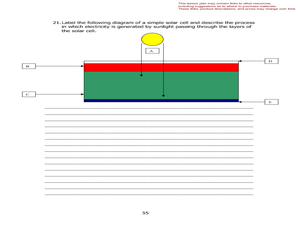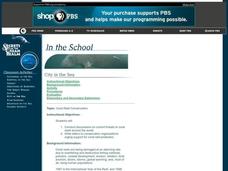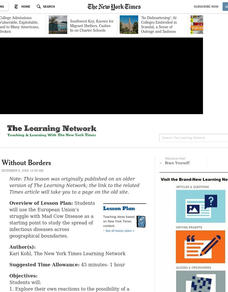Curated OER
The Photoelectric Effect
After some online instruction, chemistry aces use their creative abilities to produce a poster describing the photoelectric effect and one type of imaging technology that uses electromagnetic radiation. This simple, straightforward...
Curated OER
Goldilocks Revisited
Second graders investigate the story of "The Three Bears" while focusing on the character of Goldilocks. They answer key questions that are focused upon the development of positive feelings and reactions. Students discuss the possible...
Curated OER
Social Studies: Kite Venn Diagrams
Third graders, in pairs, complete Venn diagrams in the shape of kites displaying the attributes of a smoothly operating home and school. On the tailpieces they write roles and responsibilities for home and school. Once completed, 3rd...
Curated OER
I'm A Star!
Fourth graders answer questions about being responsible community member. They listen and brainstorm ideas of why it important to be responsible community members. Students are given a copy of "I'm A Star Community Member" game...
Curated OER
Survivors
Seventh graders explain their understanding of their strength and how it is helpful in a group situation. They also complete graphic organizers by writing at least four of their own personal strengths. Students write about their...
Curated OER
Mosquito Bytes
Students investigate mosquitoes. In this mosquito bytes lesson, students consider reasons why mosquitoes transfer disease and ways to combat them. Students read an article, discuss, and complete a quiz.
Curated OER
Air: Air Quality Picture Project
High schoolers recognize which activities contribute to poor air quality and which contribute to good air quality. They discover how air quality is measured, and come up with ways that humans can have a positive affect on air quality.
Curated OER
Producing a skit for the morning announcements
Students produce a skit to appear on their morning announcement that is in lined with their franchise topic. For this producing lesson plan, students produce a 2 minute skit including originating, scripting, editing, directing, and...
Curated OER
World Toilet Day
In this World Toilet Day worksheet, students complete activities such as reading a passage, matching phrases, fill in the blanks, choose the correct word, multiple choice, unscramble the words, sequencing, unscramble the sentences,...
Curated OER
Photovoltaics and Solar Energy
Students experiment with photovoltaic cells and determine the energy use of their appliances. In this renewable energy instructional activity, students calculate the energy emitted by a photovoltaic cell through an inquiry-based lab....
Curated OER
Breaking News English: World Toilets
For this world toilets worksheet, students read the article, answer true and false questions, complete synonym matching, complete phrase matching, complete a gap fill, answer short answer questions, answer discussion questions, write,...
Curated OER
Flora and Fauna of the Hill Neighborhood
Students compare and contrast the characteristics of plants and animals. In this ecology lesson, students observe the outdoors and describe the relationship among different living things. They relate plant diversity with animal diversity.
Curated OER
Air and Water in the Environment
Learners explore the traits of water condensation and evaporation. In this water cycle lesson, students develop an awareness of the importance of water for sustaining life. Learners participate in a hands-on activity in which water is...
Curated OER
The Human Memory
This is a well-designed, creative lesson to help students learn more about the human memory. Working in pairs, students complete tasks and gather data. Excellent websites for resources are also provided.
Curated OER
Government Policy and Its Impact on HIV/AIDS
Students examine "President Bush's Emergency Plan for AIDS Relief", identify important U.S. policy events related to AIDS/HIV from the last 25 years and hold a policy debate on the funding for AIDS/HIV programs.
Curated OER
UV Beads
Students recognize preventitive measures that can be taken to reduce the risks associated with exposure to solar radiation. They explain why solar radiation can be harmful. They utilize beads that turn color when exposed to UV rays. Good...
Curated OER
Foreign Cuisine: International Foods
Students describe factors that influence one's food choices, explain how food choices reflect one's culture and ethnic background, identify ways that family members and friends may affect one's food decisions and preferences, and explain...
Curated OER
Never Say Die: The CLock of Life
Students explore ways to turn back the genetic clock. They explore cells and mitosis. Students participate in an activity to create a flip book that will animate the process of mitosis. They explain each stage of mitosis.
Curated OER
Mountain Pine Beetles
Young scholars research and develop power point presentations that answer the question, "What is changing our forests?" In this ecology lesson, students research the niche of Pine Beetles and their increased effect on the forests in...
Curated OER
America's Heartland
Fifth graders investigate imports and exports to discover its importance to America as a world power. In this Imports and exports lesson, 5th graders discuss how climate and natural resources aid a country in becoming a world...
Curated OER
Coral Reef Conservation
High schoolers conduct discussions on current threats to coral reefs around the world and write letters to conservation organizations urging support for coral reef protection.
Curated OER
Diseases Without Borders
Students use the European Union's struggle with Mad Cow Disease as a starting point to study the spread of infectious diseases across geographical boundaries.
Curated OER
Energy Eccentricity
Students assess their own energy use to help develop an awareness of the different types of natural resources affected by consumers. Their calculations show them how much they are personally impacting the Earth. Very meaningful and...
Curated OER
How Many Birds Would It Take To Keep A Jackal Alive?
Students examine the role of large families in some animal populations. They work together to complete an activity related to food supply. They discover the relationship between preys and predators.

























